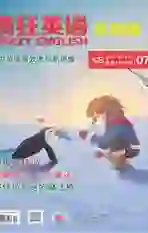品客薯片的法庭之争
2020-08-04彭向梅
彭向梅

寶洁公司曾打了一场官司,目的是证明其旗下的品客薯片并不是薯片。品客薯片究竟是不是薯片?法庭之争能否为公司省下数千万元增值税费?
难词探意
1. controversy /?kɑ?ntr?v??rsi/ n. 争论
2. ingredient /?n?ɡri?di?nt/ n. 原料
3. judiciary /d?u?d??ieri/ n. 司法部;法官
4. exempt /?ɡ?zempt/ v. 免除;获豁免
5. behemoth /b??hi?m?θ/ n. 巨头
6. newfangled /?nu??f?ɡld/ adj. 新奇怪异的
Chances are that you probably havent given much thought to that can of Pringles other than wondering “how can I get the last few potato chips out of the tube without making my arms dirty?”.
As it turns out, this salty snack has quite a story. It once was in the middle of a massive controversy that questioned the ingredients and whether the chips were actually potato chips at all.
From 2007 to 2009, the makers of the “once?you?pop?you?cant?stop” chips stood in front of three different levels of the British judiciary trying to defend the decision that Pringles chips were not—by definition—potato chips.
Heres how this comically complicated problem started. In the mid?20th century, a tax was born called the value?added or VAT tax. This “consumption tax” started off as a 10 percent tax on all goods bought from a business. More than 20 percent of the worlds tax income comes from the value?added tax making it a pretty big deal.
In Britain, most foods are exempt from the value?added tax, except for potato chips or “similar products made from the potato, or from potato flour”. This led to a long and hard journey to figure out whether or not Pringles were actually potato chips. If they were ruled as chips, Pringles parent company at the time, Procter & Gamble, would be subject to a 17.5 percent VAT tax.
Procter & Gambles initial argument was that Pringles were not potato chips because they didnt “contain enough potato to have the quality of ‘potatoness”. They also argued Pringles didnt resemble the shape of a potato chip.
In 2008, a lower British court agreed and ruled that Pringles were in fact not potato chips, mainly because they contained only 42 percent potato and had “a shape not found in nature”. But just a year later, the Court of Appeal re?examined and changed that decision, calling Procter & Gambles argument that the ingredients of a product didnt define the product “hogwash”.
With that decision, the behemoth corporation had to pay $160 million in taxes, while—unwillingly—calling their newfangled potato chips, well, potato chips. And that is the story of Pringles and its brief dance with the world of taxes, junk food and British judges.
[Reading][Check]
1. Why is a question raised in the first paragraph?
A. To arouse readers interest. B. To get the answer from readers.
C. To warn readers of the food safety. D. To remind readers to make full use of food.
2. Why are there arguments over whether Pringles were potato chips?
A. Pringles contain a low percent of potato.
B. The shape of Pringles is quite different from a potato chip.
C. Different taxes will be paid based on different judgments.
D. Different levels of the British judiciary have different opinions.
3. What can we infer from the last two paragraphs?
A. Pringles are potato chips.
B. Pringles are regarded as junk food by British judges.
C. Pringles should pay $160 million in taxes.
D. Pringles chips contain enough potato and flour.
4. Whats the authors purpose in writing the text?
A. To show how to make Pringles.
B. To promote Pringles.
C. To explain the strict rules about the tax in Britian.
D. To introduce the story of Pringles with the tax in Britain.
[Language][Study]
Sentence for writing
If they were ruled as chips, Pringles parent company at the time, Procter & Gamble, would be subject to a 17.5 percent VAT tax. 如果品客薯片被裁定為薯片,品客当时的母公司宝洁公司将要被征收17.5%的增值税。
【信息提取】be subject to 意为“易遭受……的;受……支配”。
【句式仿写】由于有雾,航班可能延误。
